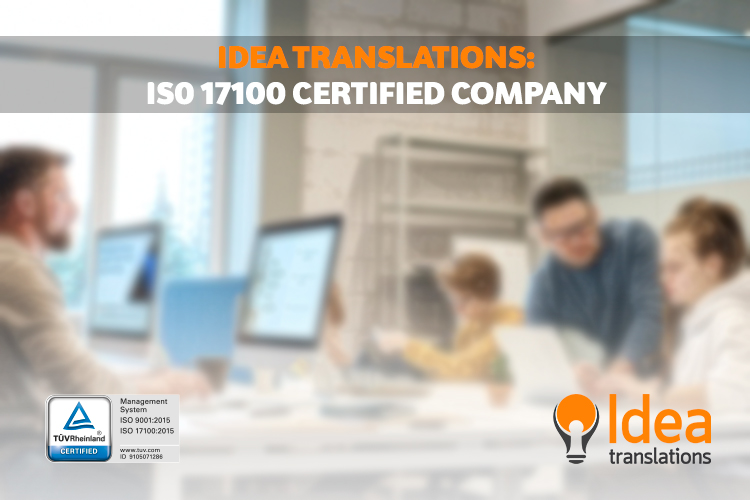
ISO 17100 Standard: What does this certification mean for translation services?
As organizations strive to broaden their horizons, removing linguistic barriers is absolutely critical. In this sense, there is a question we need to answer when choosing a translation service: What elements are vital to ensure a high-quality job that meets the needs of our organization? The ISO 17100 certification is one of the most used tools to determine quality and suitability in translation services.
What is this Standard and why is it key in translation services?
ISO 17100 Certified Translation Companies
This is an international standard that sets specific quality standards for translation services. It certifies that the services provided fulfill certain minimal requirements for this kind of projects, namely: the qualifications of translators, editors and proofreaders, resource management and availability, and data and confidentiality protection, among other essential aspects of the professional translation process. Organizations with the ISO 17100 certification can typically guarantee a highly professional service as they must complete a very stringent process to produce high quality translations and invest heavily in order to be audited and earn the certification.
Among the terms and definitions included in this Standard, there are several requirements that a service provider must fulfill; these are some examples:
- Having clear roles in the team: translators, editors, subject matter experts and proofreaders, as well as Project Managers.
- Having a documented process to ensure that the translation and project management staff has all the required competences and qualifications.
- Translators should be proficient in both the source and target languages; as well as in research, information collection and processing, and the cultural, technical and contextual domains.
- Having the necessary infrastructure to ensure availability of technical teams to carry out the projects, and to manage, store, recover, file and destroy all data and relevant documents in a safe and confidential manner.
This Standard also establishes a template for preproduction, production and postproduction processes. The core translation work also has a structured execution process that includes a review by the translator, a bilingual independent review by the editor, a subject matter expert concept review, a proofreading stage and the final verification and delivery steps.
How does this certification add value?
Organizations that have the ISO 17100 certification offer greater value to their clients, because they can attest for the professional qualifications of the linguists involved in their translations, and they know that there is a structured process approach that is centered on quality and multidisciplinary contributions.
Another key advantage is terminology: many linguistic service providers use their own jargon to describe the different stages of the translation process, and this can be confusing if you are trying to hire a professional translation service. In this respect, ISO 17100 allows clients and providers to agree on the terminology that is best suited to each project. Likewise, certified translation service companies are required to use the client’s style guide and glossary if it is available.
The International Organization for Standardization currently has 17 standards related to translation and interpretation. Source: ISO
Moreover, ISO 17100-certified companies are committed to quality: in order to achieve this certification, organizations need to obtain ISO 9001 certification first; only then can they seek to obtain ISO 17100. These companies assign many resources —in terms of money and staff— to obtain these certifications. However, once obtained, certifications need to be updated and organizations are required to carry out an annual auditing process that entails time, money and a great deal of effort. This translates into a marked difference in quality, compared to companies that do not invest so much in ongoing improvement of their services.
In the journey to global expansion and digital transformation, organizations must partner with language service providers that can be reliable and that have a vetted quality process to avoid language and culture pitfalls that can be costly and sometimes irreparable. Being ISO 17100-certified guarantees that there is a qualified multidisciplinary team behind each project, working within an established workflow and in a safe environment.
Translation is not just rendering documents in other languages: it requires a holistic approach that includes detailed steps, and this approach will ensure that translations are aligned with your company’s goals and that they help you expand your business.



